Why Are Chinchillas Nocturnal? Exploring Their Sleep Patterns

Chinchillas have large eyes and excellent night vision, which aid them in navigating their surroundings and finding food in the dark. Their thick fur provides insulation from the cold temperatures typically found in their native mountainous habitats. Chinchillas also have a keen sense of hearing, allowing them to detect potential threats even in low-light conditions.
These combined adaptations make chinchillas well-suited to their nocturnal lifestyle, maximizing their chances of survival in the wild.
Evolutionary Background of Nocturnal Behavior
The evolutionary background of nocturnal behavior in chinchillas remains a subject of scientific inquiry due to its significance in understanding their adaptive strategies. Chinchillas exhibit nocturnal behavior as a result of evolutionary advantages gained over time. Their ability to be active during the night provides them with protection from predators and allows them to conserve energy during the day when temperatures are higher. This behavioral pattern has likely been shaped by their behavioral genetics, with certain genes influencing their preference for nighttime activity.
Behavioral genetics studies have shown that chinchillas possess genetic variations that predispose them to being more active during the night. These genetic factors have been selected for over generations, leading to the development of nocturnal traits. By understanding the genetic basis of their nocturnal behavior, researchers can gain insights into how these adaptations have helped chinchillas survive and thrive in their natural habitats.
Further research into the evolutionary advantages of chinchillas' nocturnal behavior will continue to shed light on the intricate relationship between genetics, behavior, and survival strategies in these fascinating creatures.
Chinchilla Sleep Cycle Overview
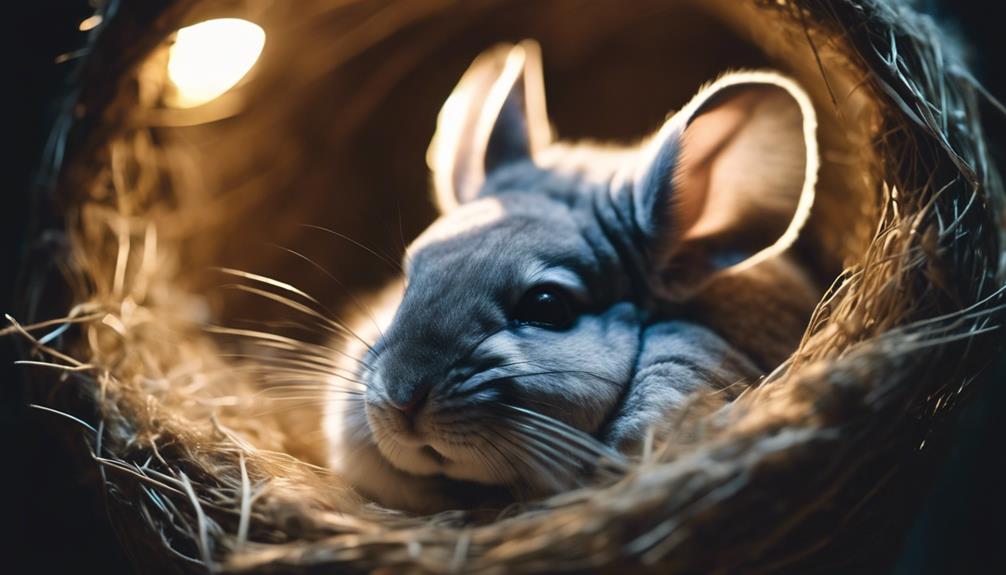
Chinchillas display distinct nighttime activity patterns, synchronized with their nocturnal nature. This adaptation to darkness is reflected in their minimal daytime movement, characterized by long periods of rest and sleep.
Understanding the chinchilla's sleep cycle provides insight into their behavioral and physiological responses to their environment.
Nighttime Activity Patterns
During the night, chinchillas typically exhibit a pattern of intermittent activity and rest, reflecting their nocturnal nature. This behavior is crucial for their survival in the wild, allowing them to avoid predators and conserve energy during the day.
However, captivity and the presence of artificial lighting can disrupt these natural patterns. Excessive exposure to artificial light can lead to sleep deprivation consequences in chinchillas, including increased stress levels and behavioral changes such as irritability or decreased activity.
It's essential to provide a dark and quiet environment during their active periods to promote their well-being. By understanding and respecting their nocturnal behavior, chinchilla owners can help ensure their pets lead healthy and happy lives.
Adaptation to Darkness
In their natural habitat, chinchillas demonstrate a remarkable adaptation to darkness through their intricate sleep cycle. Chinchillas exhibit specific behavioral changes and physiological responses that allow them to thrive in low-light conditions. Some key aspects of their adaptation to darkness include:
- Nocturnal habits: Chinchillas are most active during the night, utilizing their keen senses to navigate and forage in the dark.
- Increased alertness: These small rodents have evolved to be highly vigilant during nighttime hours, contributing to their survival in dimly lit environments.
- Enhanced vision: Chinchillas possess unique ocular adaptations that optimize their vision in low-light settings, aiding in their nocturnal activities.
- Energy conservation: By being predominantly active at night, chinchillas conserve energy during the day, aligning their behavior with their natural circadian rhythms.
Minimal Daytime Movement
Their adaptation to darkness influences chinchillas' sleep cycle, leading to minimal daytime movement as a key feature of their overall behavioral pattern. Chinchilla behavior is largely crepuscular and nocturnal, meaning they're most active during dawn and dusk, as well as throughout the night.
During the day, chinchillas tend to rest and conserve energy, exhibiting minimal movement to avoid predators in their natural habitat. This behavior aligns with their sleep habits, where chinchillas engage in short periods of sleep throughout the day, consisting of multiple naps lasting around 10-20 minutes.
Factors Influencing Nocturnal Activity
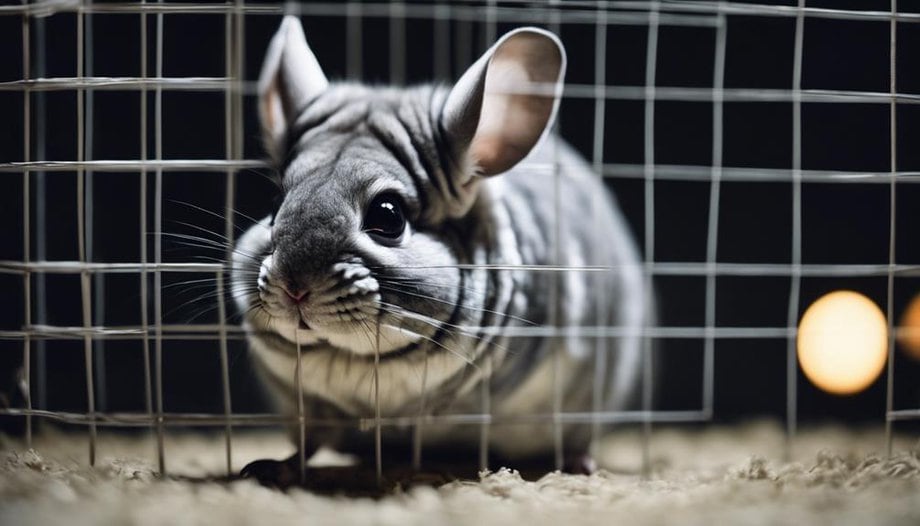
Chinchillas exhibit nocturnal activity patterns influenced by environmental factors such as temperature and light availability. These small mammals have evolved to be most active during the night, possibly as an adaptation for avoiding predators and conserving energy during the day.
Understanding the interplay between environmental influences and evolutionary adaptations sheds light on the intricate nocturnal behaviors of chinchillas.
Environmental Influences on Activity
Under varying conditions, chinchillas exhibit distinct patterns of nocturnal activity influenced by environmental factors. These factors play a crucial role in shaping the behavior and activity levels of chinchillas.
Some key environmental influences on chinchilla activity include:
- Light Exposure: Chinchillas are sensitive to light levels, with increased light often leading to decreased activity.
- Temperature Regulation: Chinchillas are more active in cooler temperatures, as they're adapted to thrive in colder climates.
- Noise Levels: Loud noises can disturb chinchillas' rest and affect their nocturnal activity patterns.
- Enclosure Size: The size of the chinchilla's enclosure can impact their activity levels, with larger spaces often promoting more movement and exploration.
Evolutionary Adaptations for Survival
In response to evolutionary pressures, chinchillas have developed nocturnal activity patterns that enhance their survival in the wild.
Behavioral ecology studies have shown that chinchillas' preference for nighttime activity is a result of natural selection favoring traits that increase their chances of survival. Being nocturnal allows chinchillas to avoid predators that are more active during the day, such as birds of prey and carnivorous mammals.
This behavioral adaptation enables chinchillas to forage for food, interact with their social groups, and engage in reproductive activities under the cover of darkness, reducing their exposure to potential threats.
Through the process of natural selection, chinchillas have evolved to optimize their survival by being active during the night, showcasing the intricate interplay between behavior and ecological dynamics in the wild.
Adaptations for Nighttime Survival
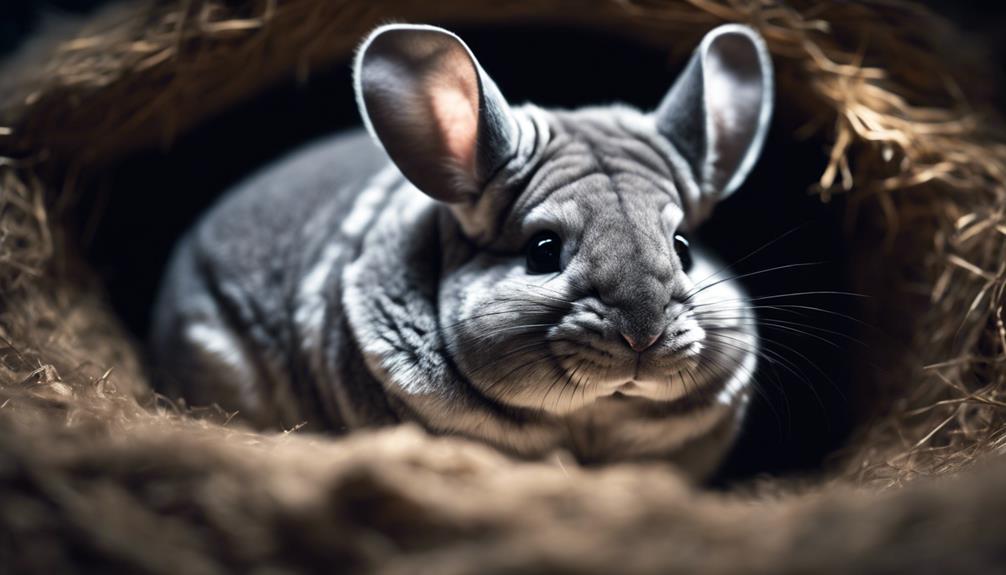
During the night, chinchillas exhibit a range of adaptations that facilitate their survival in low-light conditions. These adaptations are crucial for their ability to thrive in their nocturnal lifestyle.
- Enhanced Nocturnal Vision: Chinchillas possess a high density of rod cells in their retinas, specialized photoreceptor cells that excel in low-light conditions. This adaptation allows them to see clearly in the dark and navigate their surroundings effectively.
- Acute Hearing: Chinchillas have highly sensitive ears capable of detecting even the slightest sounds in the night. This sharp sense of hearing helps them avoid predators and locate prey in the darkness.
- Silent Movement: Their musculoskeletal system is adapted for silent movement, enabling chinchillas to move stealthily during the night. This stealthiness is crucial for evading predators and hunting prey.
- Efficient Energy Conservation: Chinchillas have evolved to conserve energy during the day to stay active and alert throughout the night. This energy-saving mechanism allows them to sustain their nocturnal activities and survive in their dark habitat.
Comparison to Diurnal Rodents
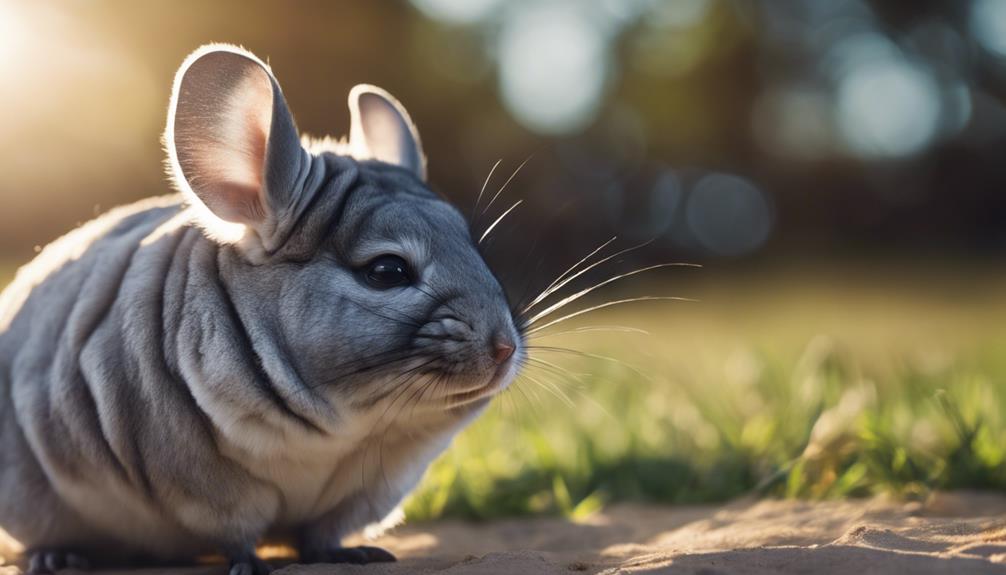
Chinchillas' nocturnal adaptations can be contrasted with the diurnal behaviors and characteristics of rodents active during the day. Behavioral differences between chinchillas and diurnal rodents are evident in their social interactions. While chinchillas are primarily active at night and engage in social behaviors during those hours, diurnal rodents exhibit peak activity during daylight, often foraging and interacting with others during this time.
Metabolic variances also distinguish chinchillas from diurnal rodents. Chinchillas have evolved to conserve energy during the day, entering a state of rest to minimize energy expenditure. In contrast, diurnal rodents have adapted to maximize energy utilization during daylight hours, requiring higher metabolic rates to support their increased activity levels.
Understanding these behavioral and metabolic distinctions between chinchillas and diurnal rodents sheds light on the diverse strategies rodents have developed to thrive in their respective environments.
Understanding Chinchilla Circadian Rhythms
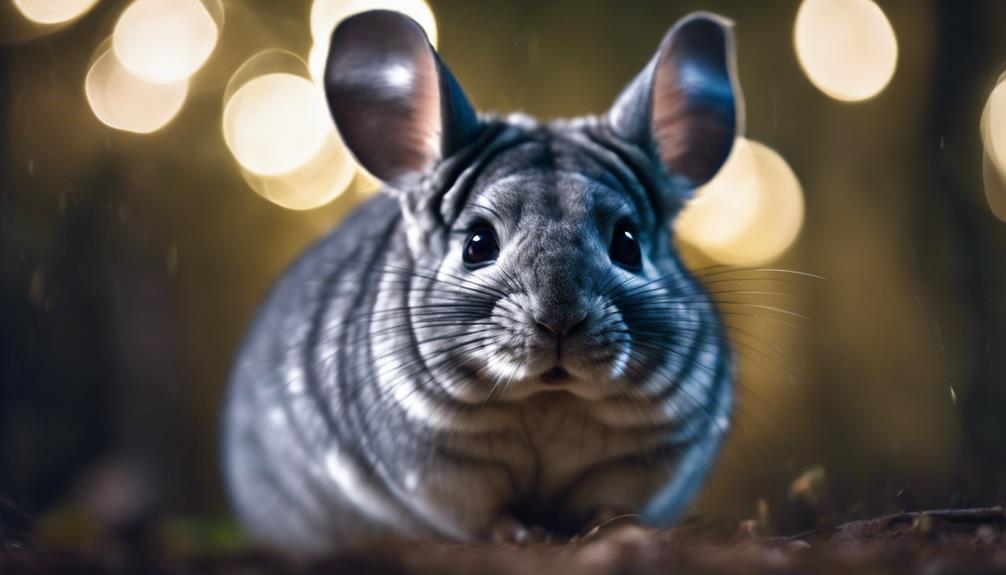
Contrasting with diurnal rodents, chinchillas exhibit distinct circadian rhythms characterized by nocturnal activity patterns and metabolic adaptations to conserve energy during the day. Chinchillas' circadian rhythms are regulated by various mechanisms involving hormone secretion, particularly melatonin production influenced by light exposure. Understanding these rhythms is crucial for providing optimal care for these nocturnal pets.
- Sleep Regulation: Chinchillas have evolved to be highly active at night, relying on short periods of rest during the day to maintain their energy levels.
- Hormone Secretion: The secretion of hormones like melatonin plays a pivotal role in regulating chinchillas' sleep-wake cycles and overall physiological functions.
- Melatonin Production: Melatonin production in chinchillas is influenced by exposure to light, with higher levels being produced in darkness to promote sleep and lower levels during daylight hours.
- Light Exposure: Chinchillas require a controlled light environment to ensure proper melatonin production and maintain their natural circadian rhythms, which is essential for their well-being.
Tips for Managing Nocturnal Pets
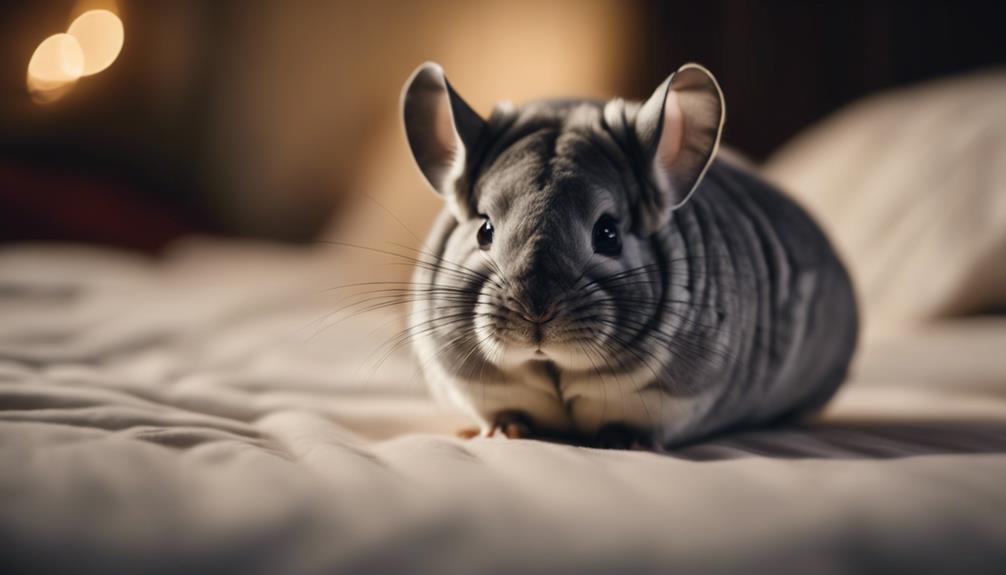
To effectively manage nocturnal pets, understanding their unique activity patterns and biological needs is essential. When it comes to creating a suitable sleep environment for these animals, it's crucial to provide a quiet, dark, and comfortable space where they can rest during the day. Adding enrichment activities such as hiding spots, tunnels, and climbing structures can help keep them mentally stimulated during their waking hours.
Diet plays a significant role in the overall health and behavior of nocturnal pets. Offering a balanced diet that aligns with their nutritional requirements is vital. Additionally, providing opportunities for exercise can help regulate their sleep-wake cycles. Interactive toys and play sessions can encourage physical activity and prevent boredom.
Frequently Asked Questions
Can Chinchillas Be Trained to Adjust Their Nocturnal Behavior to Be More Active During the Day?
Chinchillas can be trained to adjust their nocturnal behavior through behavior modification techniques. By gradually shifting their circadian rhythm and encouraging daytime activity with positive reinforcement, chinchillas can adapt to a more diurnal schedule.
Do Chinchillas Experience Any Health Issues From Being Nocturnal Animals?
Chinchillas' nocturnal behavior may affect their health. Disrupted sleep patterns could lead to decreased sleep quality, impacting overall well-being. Being active at night may also influence food consumption patterns, potentially affecting their metabolism and nutritional intake.
Are There Any Specific Noises or Activities That Can Disturb a Chinchilla's Sleep During the Day?
Chinchillas have high noise sensitivity, making daytime activities like loud music or construction work disruptive to their sleep. Sleep disturbances can impact their health and behavior, so it's essential to provide a quiet environment for them.
How Do Chinchillas' Nocturnal Habits Impact Their Interactions With Other Animals in Their Ecosystem?
Chinchillas' nocturnal interactions play a crucial role in ecosystem dynamics. Their behavioral adaptations, like diurnal shifts, influence relationships with other animals. Understanding these nocturnal habits is fundamental for comprehending the interconnectedness of wildlife populations.
Are There Any Differences in the Sleep Patterns of Wild Chinchillas Compared to Domesticated Ones?
Wild chinchillas typically follow a nocturnal sleep cycle, a natural adaptation to avoid predators and extreme temperatures. Domesticated chinchillas may show behavior changes in response to environmental factors, potentially altering their sleep patterns.










